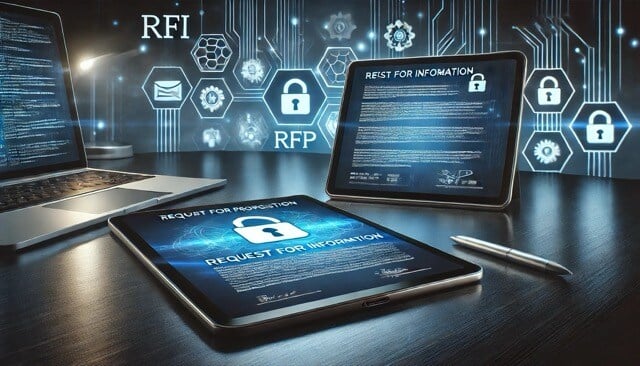Continuous Control Monitoring (CCM) is a critical component in today's cybersecurity landscape, providing organizations with the means to enhance their security posture and streamline operational efficiency. Gartner defines CCM as "a technology designed to improve organizations' security posture and the productivity of CISO and IT operational teams by automating control effectiveness monitoring and relevant information gathering from diverse sources in a near-real-time manner."
Established to address the evolving cybersecurity threats and compliance requirements, CCM serves a vital role in various industries, particularly those handling sensitive data and facing stringent regulatory mandates. It's effective for organizations striving to bolster their security defenses, mitigate risks, and ensure compliance with industry standards and regulations.
Critical Components of Continuous Control Monitoring Tools
Gartner outlines several critical capabilities that define effective Continuous Control Monitoring solutions:
Data Integration
Data integration is a cornerstone of practical CCM tools. In today's complex IT environments, organizations generate vast amounts of data from various sources, including security tools, network devices, and applications. Effective continuous control monitoring software seamlessly integrates with diverse data sources, consolidating information into a centralized platform for analysis and monitoring. This integration allows organizations to gain real-time visibility into their security landscape, identify emerging threats, and respond promptly to security incidents.
Furthermore, data integration enables organizations to correlate information from different sources, providing contextual insights into security events and trends. For example, integrating data from vulnerability scanners with log management systems can help organizations prioritize remediation efforts based on vulnerabilities' severity and potential impact on the business. By harnessing the power of data integration, organizations can make informed decisions about their security strategy, allocate resources more effectively, and ensure compliance with industry regulations and standards.
CyberStrong has integrated with Snowflake to pull data from the cloud environment to normalize and leverage to enrich cyber risk assessments. Additionally, this data can be funneled back to the SIEM environment for customized reporting and analysis.
Control Content Management and Control Mapping
Control content management and control mapping are essential capabilities of CCM tools. They enable organizations to manage their control frameworks effectively and align with industry regulations and standards. CCM solutions provide robust capabilities for organizing, updating, and maintaining control content, ensuring organizations can access the latest guidance and best practices. Additionally, control mapping allows organizations to map controls to relevant frameworks and regulations, such as the NIST Cybersecurity Framework, ISO 27001, or GDPR.
By aligning controls with industry standards, organizations can demonstrate compliance to auditors and regulatory authorities, streamline audit processes, and effectively manage risk. Furthermore, control mapping facilitates cross-functional collaboration and communication within organizations, ensuring that stakeholders across departments clearly understand their responsibilities and obligations regarding security and compliance.
Scoring and Alerts
Scoring and alerts are critical aspects of CCM tools, providing organizations with the means to assess control effectiveness, identify potential risks, and respond promptly to security incidents. Scoring mechanisms evaluate the effectiveness of controls based on predefined criteria, such as control implementation status, compliance with policies, and adherence to security best practices. By assigning risk scores to individual security controls, organizations can prioritize remediation efforts and focus resources on addressing high-risk areas.
Additionally, alerts and notifications enable organizations to detect security incidents and compliance violations in real time, allowing them to take immediate action to mitigate risks and minimize impact. CCM solutions should provide customizable alerting capabilities, allowing organizations to define thresholds and criteria for triggering alerts based on their specific requirements and priorities. By leveraging scoring and alerts, organizations can proactively monitor their security posture, detect emerging threats, and respond rapidly to security incidents, reducing the likelihood of data breaches and compliance failures.
Visualizations
Visualizations are crucial in CCM tools, as they provide stakeholders with intuitive and actionable insights into their organization's security posture and compliance status. Automated visualizations translate complex security data into easy-to-understand charts, graphs, and dashboards, enabling stakeholders to quickly identify trends, patterns, and anomalies. By presenting information visually, organizations can quickly assess their security posture, identify areas of improvement, and make informed decisions about their security strategy.
Furthermore, visualizations facilitate communication and collaboration within organizations, allowing stakeholders to share insights and align on security priorities effectively. CCM solutions should offer customizable visualization capabilities, allowing organizations to tailor dashboards and reports to their specific needs and preferences. Whether tracking compliance metrics, continuously monitoring security incidents, or analyzing risk trends, visualizations empower stakeholders to drive meaningful action and constantly improve their security posture.
The CyberSaint Approach to Continuous Control Monitoring (CCM)
Amidst the evolving cybersecurity landscape, CyberStrong offers a unique approach to CCM through Continuous Control Automation (CCA). CCA leverages automation and advanced analytics to streamline control monitoring and cyber risk management processes, enabling organizations to proactively identify and address security risks. CyberStrong’s CCA solution provides unparalleled visibility into the organization's security posture by integrating various data sources and security tools.
This integration aggregates information from disparate sources, such as vulnerability scanners and SIEM systems, creating a holistic view of the IT environment. Additionally, the platform excels in managing control content and mapping it to relevant frameworks and regulations, ensuring alignment with industry standards. Dynamic scoring mechanisms and real-time alerts enable organizations to assess control effectiveness and swiftly address emerging threats or compliance issues, prioritizing remediation efforts based on risk scores.
CyberStrong's CCA platform also offers intuitive visualizations and dashboards, empowering stakeholders with actionable insights to make informed decisions about their security strategy. The platform presents control performance metrics, compliance status, and risk trends in a user-friendly interface, allowing stakeholders to identify improvement areas and track progress over time. By leveraging these capabilities, organizations can enhance their security posture, ensure regulatory compliance, and proactively manage risks in an evolving threat landscape.
Learn more about cybersecurity dashboards and Board reporting tools like the Executive Dashboard with our guide.
Ultimately, CCM software enhances organizations' security posture and compliance readiness. By leveraging critical capabilities such as data integration, control content management, scoring and alerts, and visualizations, CCM solutions enable organizations to manage risks and ensure regulatory compliance proactively.
With CyberStrong's innovative approach to CCM through Continuous Control Automation, organizations can effectively strengthen their security defenses and adapt to the evolving threat landscape.
Meet with the CyberSaint team to learn more about our AI-backed approach to automation.





.png)
.png)
.png)
%201.png)
.png)




